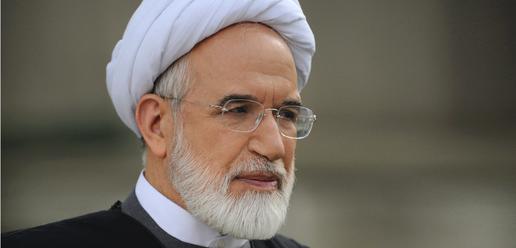Mehdi Karroubi, the 80-year-old former speaker of the parliament and the 2009 reformist presidential candidate, has openly criticised Ayatollah Khamenei, the Supreme Leader of the Islamic Republic, accusing him of tyranny, abuse of power, militarism and violating citizen’s rights, among other crimes. He also accused the Islamic Republic regime of feeling threatened by people exercising their right to protest.
In an open letter, Karroubi, who has been under house arrest since February 2011, also accuses Khamenei of interfering in elections, going against the principles of the constitution, violating the independence of Qom Seminary, avoiding accountability, eliminating his competitors and helping military institutions to gain economic monopolies.
“The regime is in such a dire situation that it feels threatened by the gathering of a few thousand people who have had enough of injustice and corruption,” wrote Karroubi, referring to recent protests in cities across Iran. “Under such conditions, it is natural that the downtrodden classes, who were the grassroots supporters of the Islamic Revolution, will turn into a gunpowder barrel.”
Karroubi also points to the Supreme Leader’s son Mojtaba Khamenei and his interference in the presidential elections of 2005 and 2009.
Throughout his letter, Karroubi compares, unfavorably, the leadership of Khamenei to that of Ayatollah Khomeini, the founder of the Islamic Republic. Of course, the picture Karroubi portrays of Khomeini’s time owes more to his loyalty to the memory of Khomeini and to Khomeini’s kindness toward Karroubi and people who share his worldview than to historical facts. Nevertheless, Karroubi uses the contrast to demean Khamenei’s rule, and to show that it has gone terribly wrong.
Failed Reconciliation
In recent months, the High National Security Council has approved changes to the conditions of the house arrests of Karroubi and Mir Hossein Mousavi, who also ran for president in 2009. Karroubi’s family has been allowed to visit him freely and a number of political figures have also met with him. But the new letter, the latest in a series of letters from Karroubi to Khamenei, show that efforts to reach an agreement with Karroubi to end his house arrest on terms favorable to the regime have failed.
The regime has been planting short, vague news stories in the media in an effort to show that Karroubi and Mousavi are being handled with kindness. But the letter shows that Karroubi is not willing to accept the conditions being offered — especially as he ends his letter saying: “I and my advisors are ready to participate in any debate about the [presidential] election of 2009 and events that followed.”
In another part of his letter, he writes: “I accept my responsibility for reforming the system according to the ideals of the revolution and the rights of the people as embodied in Article 3 of the constitution.” These two sentences clearly demonstrate that, for Karroubi, the end of his period of house arrest does not simply mean that he will be allowed to meet his friends and relatives. What he wants is the right to be politically and socially active.
Karroubi’s letter, however, also pays special attention to two institutions and two political figures: The Revolutionary Guards, the Assembly of Experts, Khamenei’s son Mojtaba and Ahmad Jannati, the secretary of the Guardian Council.
“The political behavior of some of Guards commanders has brought about political instability and created a despotism that has deprived the nation of its political rights and has put an end to the idea of the regime being a republic,” writes Karroubi.
Attack on the Revolutionary Guards and the “Uniquely Feeble-Minded” Jannati
Karroubi describes Jannati as “uniquely feeble-minded and hasty in libeling people and interfering in the elections.” Karroubi also accuses Mojtaba Khamenei of being the chief instigator of interference in the 2005 presidential election that ended up in a victory for Mahmoud Ahmadinejad. He also points out the illegal behavior of the Revolutionary Guards during that election. He further accuses Mojtaba Khamenei of playing an important role in the “coup d’état” of 2009 that won Ahmadinejad a second term as president.
Karroubi describes the Assembly of Experts as a “rubber stamp” body with only one duty — praising the Supreme Leader.
The former speaker of the parliament accuses the Revolutionary Guards of bolstering tyranny, causing political instability, corruption, economic monopoly, and creating a parallel intelligence network to trample on people’s rights. The letter asks the Supreme Leader to accept responsibility for the current situation in Iran after three decades of absolute rule and to stop playing the role of the opposition. “During the last three decades, you have eliminated the main revolutionary forces to implement your own policies, and now you should face the results of that,” he says.
The Revolutionary Guards, the Assembly of Experts, Jannati and Mojtaba Khamenei all have one main chief feature in common: they will play key roles in selecting a successor to Ayatollah Khamenei as the Supreme Leader. Karroubi has concentrated his attacks on them because does not want a repeat of Khamenei’s absolute rule. “Some have dreams for the Assembly of Experts,” he writes, “and to realize these dreams everybody must be sacrificed.” He then asks Khamenei a question: “How do you want to bequeath this untamed beast of power to somebody else without setting it right and reforming the structure of the regime?”
But Karroubi answers his own question. There will be a “calamity” in the future if things continue the way they are now, he says. In his letter, he appeals to the Supreme Leader to implement structural changes to prevent such a calamity, but he is unlikely to find a receptive ear. Regardless, Karroubi’s letter — his evaluation of Khamenei’s record as Supreme Leader — is likely to become an important historical document of post-revolutionary Iran.
visit the accountability section
In this section of Iran Wire, you can contact the officials and launch your campaign for various problems


























comments